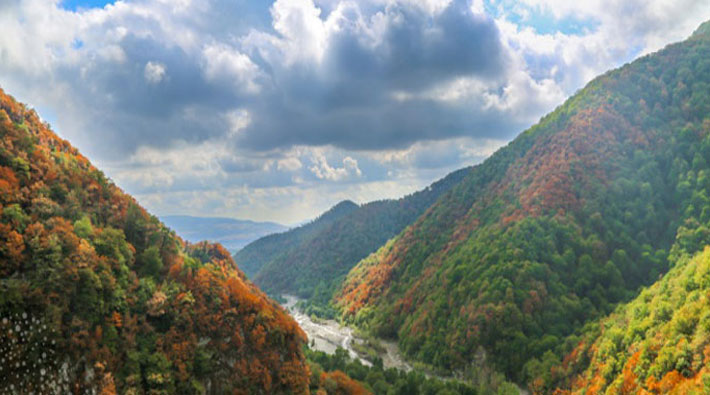Geography of Azerbaijan

The Republic of Azerbaijan has an area of 86.6 thousand square kilometers. The territory of the country extends 400 km from north to south, and 500 km from west to east, and locates between latitude 38'25"-41'55" North and longitude 50'-50'51" East. The highest point in Azerbaijan is Mount Bazarduzu in the Greater Caucasus, at 4,485 m (14,714ft), and the lowest point is - 28 m (-92 ft), in the Caspian Sea.
The country is situated at the crossroads of Europe and Asia has a unique geopolitical and geographical position.
Azerbaijan is characterized by a diverse landscape. There are two major forms of landscape -plains and mountains. Mountains cover 60% of the total area of the country. The principal geomorphological structures of Azerbaijan - Gretater Caucasus, Lesser Caucasus (with Garabagh plateau) and Talysh Mountains.
The climate in Azerbaijan is mainly influenced by geographical position, landscape and the Caspian Sea. The semidesert and dry, subtropic, temperate and frigid types of climate dominate in the country. 9 out of 11 climate zones are present in the country.
The rivers Kura and Araz – the largest rivers in the Caucasus, are the main sources of hydroelectric energy and irrigation. Azerbaijan accounts for 8400 small and large rivers, including 850 over 5 kilometers in length. There are 24 rivers extending to over 100 kilometers.
Azerbaijan has rich flora and fauna. The country accounts for 66% of all plant species found in the Caucasus with 1213.7 thousand hectares of woodlands. Azerbaijan is situated on the junction of a number of zoogeographical zones, characterized by a specific fauna.
The country is rich in three types of mineral products that are metallic, non-metallic and combustible mineral products. Azerbaijan is famous for its oil and gas deposits. The Caspian Sea is home to large oil reserves, and the first offshore oil wells in the world were built near Baku. The world-famous oil of Naftalan cures a number of diseases.
Azerbaijan is also rich in mineral waters, with different chemical ingredients. Due to this Azerbaijan is called the museum of mineral waters. Istisu (in Kelbedjar), Badamly and Sirab (in Nakhchivan Autonomus Repubic) are famed mineral waters.
The Caspian Sea, largest enclosed water basin in the world, has a unique physical and geographical properties. The flora and fauna of the Caspian Sea are rich in endemic species.





